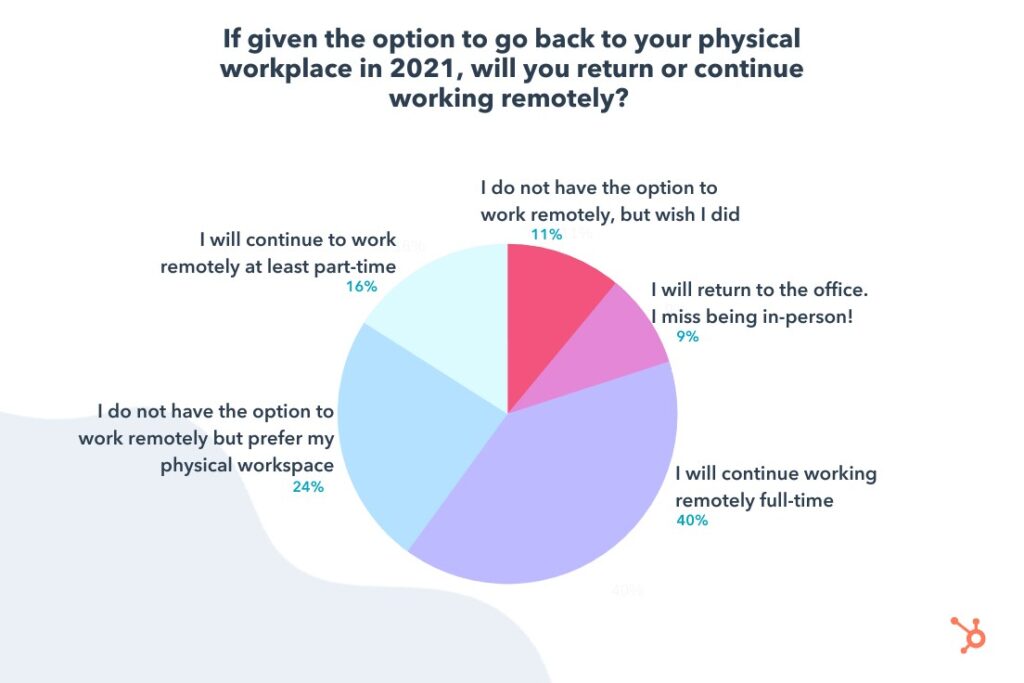Back in 2018, I chose to work at HubSpot because I loved HubSpot's content, and its culture.
Oh — and the smoothie bar, waffle Wednesdays, and ping pong tables didn't hurt, either.
Office space has undeniably seen a change in recent years. Open-floor plans have become increasingly popular, as have standing desks, beer on-tap, game rooms, and even greenhouse spaces. As this decade came to a close, many of my closest friends chose jobs based, at least in part, on office vibe.
And yet, it's long been said that remote work is the future. In fact, HubSpot has been touting the benefits of remote work since 2012 in its Culture Code, which states: "Work isn't a place we go, it's a thing we do."
In 2020, that premonition became a reality as the pandemic forced an entire global workforce to shift to remote work practically overnight.
And now, as the dust settles and employees find new, innovative ways to work productively from home, many businesses are wondering: Do we even need an office, anymore?
Let's explore how marketers across the U.S. feel about remote work in 2021, and whether remote work is just a current necessity — or the new long-term reality.
Will employees return to the office?
To explore whether or not employees will return to the office in 2021 (if they're permitted to do so), I started by surveying 496 marketers and asked the question: If given the option to go back to your physical workplace in 2021, will you return or continue to work remotely?
The results were split roughly in half. 40% of marketers will continue to work remotely full-time — and the remaining 11% don't have the option to work remotely, but wish they did.
However, that leaves 49% of marketers who do want the option to work in an office space, at least part-time.
Let's break down that 49% for a second: out of that 49%, 24% of marketers don't have the option to work remote, but prefer their office space anyway; 9% want to return to the office as soon as it's possible to do so; and 16% prefer a flexible schedule so they have the option to do either.
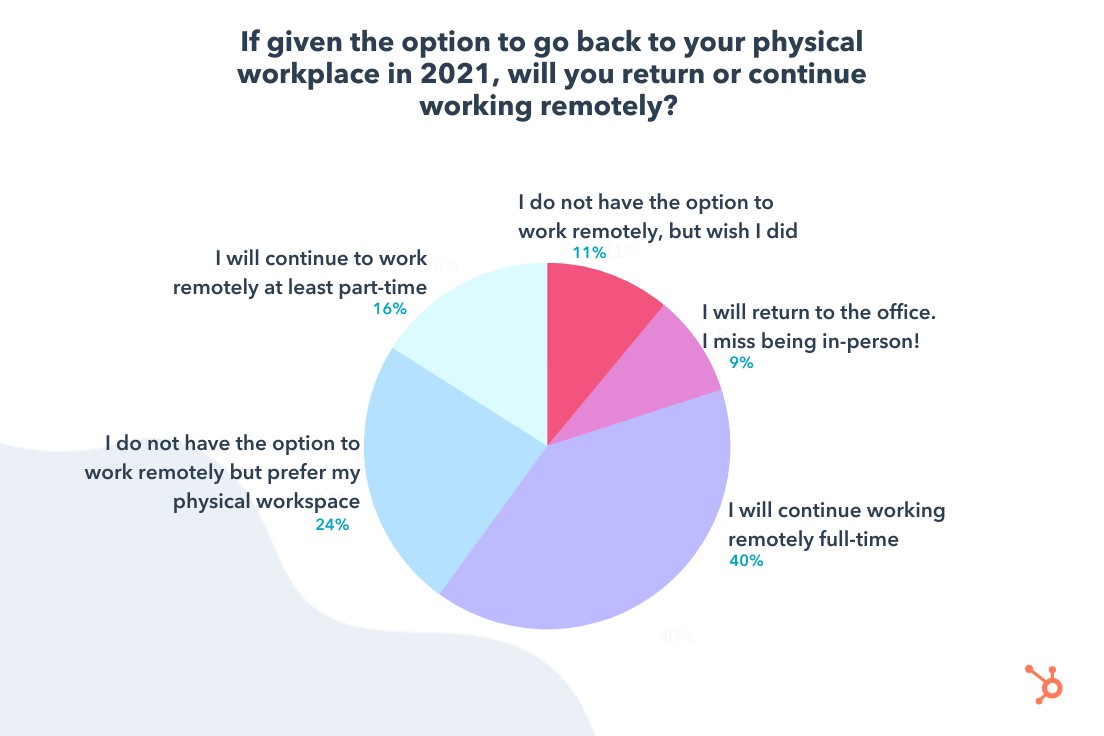
Other research supports this trend. Pew Research Center surveyed over 10,000 U.S. adults and found 54% of workers want to continue working from home after the pandemic ends. A third echoed they'd like to work remotely at least partially — while just 11% said they'd like to return to the office full-time.
HubSpot's employee data highlights this shift as well, with many employees now preferring remote work over in-office — in fact, two-thirds of HubSpot employees plan to work remotely more often even after offices re-open, and approximately 16% plan to shift to fully-remote for the first time.
I spoke with Meaghan Williams, HubSpot's Remote Work and Inclusion Program Manager, to get a better sense as to why many marketers may want to remain remote even after the pandemic has ended. She told me: "Before COVID-19 forced everyone to work from home, a 'work from home day' for an office-based employee was often scheduled on a day where perhaps they had appointments, deliveries, or weren't feeling well."
"'Work from home' quickly became equated with low productivity, distraction, and working from one's couch. With the long-term commitment to working from home, I suspect many folks have found a way to carve out a productive work space, create a routine, and make the most of their working hours to enable more productivity."
Williams says, "Working remotely is not for everyone, but for some, the ability to focus without the distraction of the office or freedom to be able to jump on your laptop when creativity strikes (rather than try to hold onto the idea while sitting in traffic!) may have them hooked on remote for the long-haul."
Of course, logistics will factor into an employee's decision to return to an office, as well. For instance, many businesses are selling their office spaces and subsequently forcing employees to become fully-remote; alternatively, some companies are relocating to satellite offices, or simply reducing the amount of office locations they own globally.
Ultimately, the data suggests that many employees will want to remain remote after the pandemic has ended, but others will prefer having the option to return to an office.
Which poses a unique challenge: How can companies meet all its employees needs, when those needs seem split so evenly down the middle?
Many companies (HubSpot included), will be increasingly interested in creating a hybrid experience — meaning, employees will have the option to remain fully-remote, return to the office full-time, or experience a little of both.
Let's dive deeper into what this data means for marketing managers, next.
What the Data Means for Marketing Managers
If you're in a management position, you'll likely find that many of your employees want to remain remote even after the pandemic has ended.
Remote life has its perks. For instance, Vrnda LeValley, a Customer Training Manager at HubSpot, told me, "I plan on staying totally virtual because I enjoy using my commute time to meditate and mentally prepare for my day. Additionally, I love the flexibility to work from anywhere."
"I like that working remotely frees up my ability to select places to live that truly support the inclusive and diverse experience that is so important when establishing a sense of community and belonging."
Additionally, Leslie Green, HubSpot's Senior Social Media Campaign Manager, says, "I decided to move to a fully remote employee during the pandemic to be closer to my network and to choose my home, not based off my job, but where I actually want to live. Being near my network and in a city (Austin) that fits my lifestyle allows me to 'show up to work' as my best self daily."
Remote life offers employees the flexibility to work where, when, and how they want; and it enables companies to attract talent from across the globe without barriers like physical proximity to an office remaining a factor in hiring decisions.
However, there are certain challenges you'll face when leading a remote team — many challenges of which have been highlighted during the 2020 pandemic-activated shuffle. Let's dive into a few of those, now.
1. Marketing managers will need to invest in high-quality remote tools and platforms.
If you're managing a remote team, you've likely come across some unique challenges regarding communication and technology.
For instance, 39% of employees believe their transition to remote work would be improved with better remote tools and platforms to communicate and collaborate.
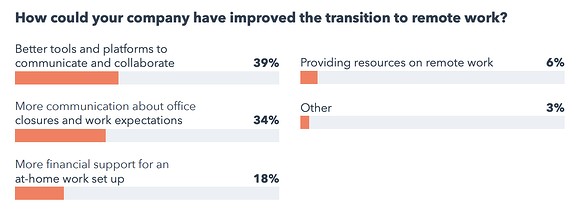
High-quality video conferencing tools, messaging platforms, and task and project management software are necessary for ensuring your team continues to perform well regardless of where they work in 2021 and beyond.
Additionally, collaboration tools like Google Suite or Microsoft Office Teams can help you align your team on your company's vision and the specific functions your team needs to complete to help your company grow over the next year.
With 45% of remote employees worrying about team collaboration when it comes to working with colleagues both in-office and remote, it's critical you continue to invest in tools that help you create alignment regardless of where each team member works.
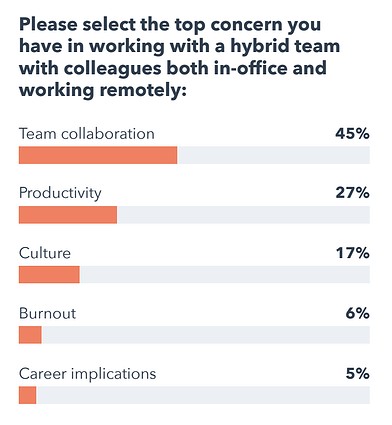
2. Marketing managers should continue prioritizing remote employees' growth.
As a manager, it's critical you ensure your employees feel they're continuing to grow in their roles even when fully-remote.
Seeking out unique growth and development opportunities might feel more difficult when working remote than in-person — in fact, 40% of remote employees feel remote life has negatively impacted their career progression:
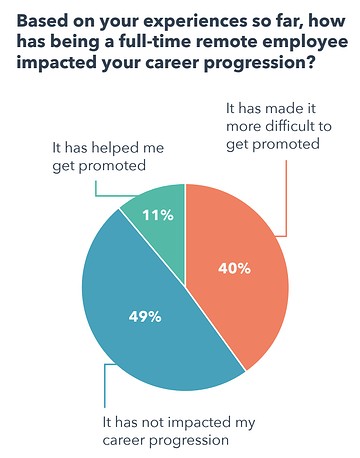
To continue facilitating your employees' growth over the long-haul, it's critical you set up yearly or bi-yearly performance and career growth conversations, even when working remotely.
Additionally, consider how you might implement task-tracking or project management documentation to stay on-top of your employees' progress when you ask them to perform certain marketing activities, since you no longer have the privilege of watching them excel in-person.
Standardizing the tools you use to track your team's progress can help you quickly identify high-performers on your team and reward them accordingly.
3. Marketers need to lead with empathy.
Your team is dealing with a highly-stressful and difficult time — and not just professionally.
Many team members are likely juggling childcare, mental health stressors as a result of the pandemic, and other major deterrents to their daily work. In fact, 46% of employees surveyed say their work performance has been negatively impacted due to changes at home as a result of COVID-19:
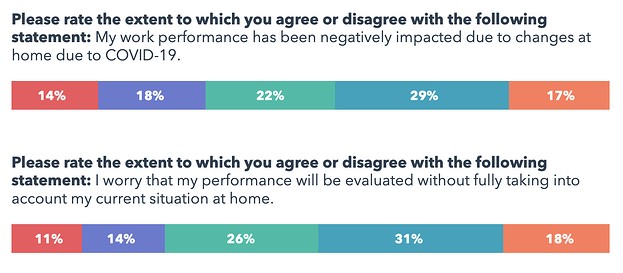
Additionally, roughly 50% of employees worry their performance will be evaluated without taking those challenges into account.
A good manager leads with empathy — when having weekly discussions with your employees or even performance reviews, it's vital you take the time to understand outside factors that could contribute to less-than-ideal performance, and keep those factors in-mind when evaluating your employees' performance.
Additionally, understanding your employees' situation could help you recognize areas you might be able to support them as their leader. For instance, if you know an employee is on "childcare duty" in the mornings, it's important you take the extra step to ensure you're not Slacking them during that time or scheduling meetings they can't attend.
These small details could go a long way towards creating a healthier, more productive work-life balance for all your employees.
While these tips should help you as you learn to lead a remote team, you'll likely come across some unique challenges as offices reopen and businesses segue into a hybrid workplace. Next, let's explore some expert tips on how you can create — and embrace — a hybrid workplace for the long-term.
Expert Tips on Creating Hybrid Workplaces
To explore how businesses can create hybrid workplaces in 2021 and beyond, I spoke with Eimear Marrinan, HubSpot's Director of Culture.
She told me: "One of the biggest things to consider is how to effectively create a culture that enables productivity and, ultimately, engagement in a hybrid work model."
Marrinan adds, "Being proactive in thinking critically about your culture will make or break many organizations this year."
When you're beginning to consider how you might create a hybrid workplace, there are a few factors Marrinan encourages leaders to keep in-mind. These include:
- Create a truly inclusive environment, one that is equitable regardless of location. That means being really purposeful and intentional about how you engage with employees — tactical things like holding team meetings or offsites virtually if not all employees are in-office, leaning into virtually inclusive events and programmings so the experience is the same regardless of where you sit, and making sure any perks and benefits are location-agnostic and not dependant on an office location. For instance, we announced at HubSpot in 2021 and 2022 any new benefits and perks can be enjoyed regardless of location.
- Culture is not tied to an office — it is rooted in an organizations values and behaviors. Making sure that you have the right values and behaviors in-place to begin with becomes so important as organizations shift to hybrid. Bring your culture back to the basics, and consider the fundamentals — e.g. having a culture of flexibility, adaptability, and empathy.
- Ask your employees for feedback. At HubSpot, we invest in seeking feedback from our employees upfront regarding what they value, what they want, and what concerns they have. Listen to your employees — and not only listen, but act on the feedback. This is new for so many companies, so we can't just assume we know all the answers ... we most certainly don't.
Tamara Lilian, HubSpot's Manager of Culture and Experience, echoes Marrinan's advice, adding, "Creating an effective hybrid workplace will take full commitment from the business, along with adaptability and empathy. No matter how strong your in-office experience was prior, this culture you value so deeply will not translate to a hybrid world on its own."
Let's explore a few other tips when it comes to creating a hybrid workplace, from marketers and leaders in the industry working to embrace the hybrid experience.
1. Make intentional decisions with the hybrid experience at the forefront of your mind.
Tamara Lilian, HubSpot's Manager of Culture and Experience, suggests making intentional decisions from the get-go to ensure remote work isn't just an afterthought in your planning: "Before you create any experience for your employees in a hybrid world, you first need to nail being proactive versus reactive, and really be intentional on your approach to the experience."
She adds, "Zoom links, considering timezones, and being mindful of an employees work-from-home environment can no longer be an afterthought — these have to be built into your approach from day one."
To truly invest in a hybrid environment, it's vital you make decisions without preference towards those at-home or in-office. Instead, you'll want to create an experience your employees can enjoy from anywhere.
2. Shift your current employee offerings to meet their new needs, and include employees in your process.
A few years ago, most of HubSpot's onboarding trainings were in-person, which meant you needed to fly to an office and stay in a hotel to attend them.
Now, the trainings are entirely remote.
It's critical, as you move to a hybrid model, that you figure out how to shift your current offerings so they can offer equal value regardless of a person's physical location.
Lilian asks, "How can you shift your current offerings to meet your employees' needs in a hybrid world — for instance, perhaps you consider how you can pivot your growth and development offerings to more of a self-serve model where folks can engage with resources when and where is best for them, and not on your timezone or schedule."
3. Allow flexibility in your employees' schedules.
Ivelisse Rodriguez, a Historical Optimization Specialist at HubSpot, urges employers to encourage flexibility when switching to a hybrid workplace.
She told me, "One of the principal benefits of being remote is the ability to create a unique work schedule. When companies remain inflexible — i.e. expecting employees to log in exactly at 9 AM or constantly checking in on them on Slack to see if they're online — they take away one of the principal benefits of being remote."
"Remote workers lose social contact, office banter, and in-person camaraderie, but the flexibility makes up for that. Stay flexible, trust your employees to get their work done, and don't get obsessed with someone's 'online' status. Whether they're online or not has no bearing on whether they're actually getting work done."
4. Remote workers shouldn't be the exception to the rule.
HubSpot's Senior Director of Creative, Dmitry Shamis, told me: "I was remote before the pandemic, but something I learned during the last year is that remote doesn't have to be the exception to the rule."
"I used to travel the office once a month thinking it was a must for keeping the team together and showing people that I'm accessible, and now that there's no office I realize how much time I wasted with TSA, weather delays, hotel check-ins, etc. — plus, how much forced activity needed to happen when I was around."
"From here on out, I think when the team does get together (and keeps it virtually inclusive), it will be a lot more genuine. People need to learn not to lean on a physical office space as a crutch — there are better ways to connect with people regardless of location."
5. Encourage your employees to take advantage of the perks of remote meetings.
Stephanie Worley, Microsoft Advertising's Global Brand Storytelling Leader, told me how important it is for her and her team to set boundaries regarding work and home life: "People are certainly working long hours these days. In my role at Microsoft Advertising, I spend my day connecting with colleagues, customers, and partners around the world. Microsoft Teams has become the glue that connects us and supports our conversations and collaborations through video calls, chat, and sharing documents."
She adds, "One thing we've realized during this pandemic is that without the normal work transitions of a commute, walking between meetings and walking to the break room, we can easily sit in front of our desks from early morning to late in the night if we don't set some boundaries for ourselves."
Additionally, she says she's personally found it helpful to take some meetings outside for the fresh air and new perspective: "Microsoft Teams is mobile, which allows us to participate in meetings and collaborate with peers from anywhere. I have begun a new practice of taking a walk during meetings. A daily walk during a meeting helps me get out, get some fresh air, exercise, and stimulate some more creative thinking."
As your team adjusts to a hybrid setup, consider encouraging each employee to switch up where they take meetings. Whether you're in-office or remote, a hybrid team gives you all the flexibility to take meetings on-the-go.
6. If feasible, offer at-home stipends. Additionally, prioritize your employees' mental health as they adjust to this new normal.
Christina Mautz, Chief Marketing Officer & Head of Sales at Moz, shared a few critical components she's used to help her team adjust over the past year.
She told me, "Moz operated as a remote-first company prior to any changes mandated by the pandemic. We've found employees work best when office culture prioritizes things like accountability, empathy, and transparency. Those values are so much more important than asking our teams to be at their desk for a set amount of hours per day."
"That being said, 'remote work' means different things to many different people. The young colleague who is fresh out of college may not have a dedicated office space in their home, while new or working parents might feel the conflict of juggling day-to-day tasks against sharing the same space with their virtual-learning children. To help, Moz offers stipends for home internet, mobile phone service, plus a $500 home office reimbursement."
Above all, she notes the importance of prioritizing your employees' mental health: "We've addressed the many life-changing experiences we've all lived through publicly and made sure our employees know they can speak with HR and leadership openly. We've also reminded Mozzers of our Employee Assistance Program that provides mental health benefits for those in need."
"And, while it might seem easier to work remotely compared to commuting to the office, our team managers encourage employees to take care that work (because it’s now happening at home) doesn’t take over. As a global office across many time zones, not every question gets an immediate answer. Project progress and KPIs still rest on shoulders; but, as an organization, we've shared that we know our staff can't go at 100% all the time."
Moz's CMO told me, "Each of these components are intended to help our employees thrive in whatever 'office' they are in — during these isolating times, and long after."
The good news? This "new normal" is offering companies the chance to truly redefine their values and enable employees to make their own decisions regarding where, when, and how they perform best.
The companies that come out on top will be the companies that listen and grow with these global changes to continuously improve workplace culture.
Trust us: Your employees will thank you.

